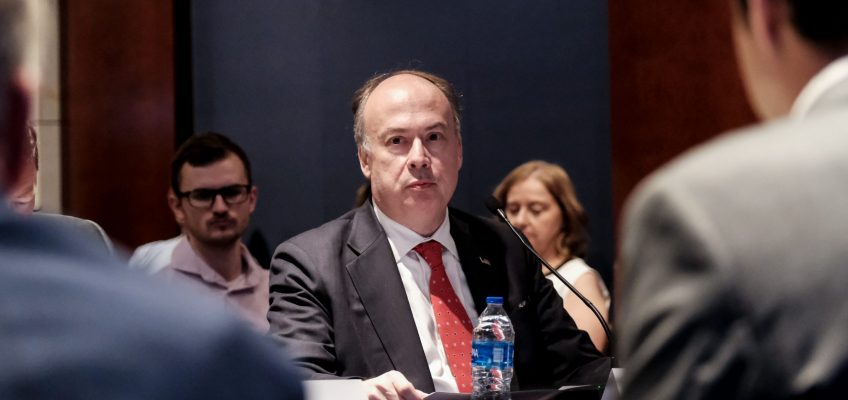An attempt by D.C. bar authorities to force former Justice Department attorney Jeff Clark to fork over documents — part of an effort to potentially disbar the former President Donald Trump ally — would violate his Fifth Amendment rights, a D.C. appeals court panel ruled Monday.
In a brief order, the three-judge panel of the D.C. Court of Appeals agreed that the investigators’ effort to subpoena documents from Clark “infringes on Mr. Clark’s Fifth Amendment right not to be compelled to be a witness against himself.”
Clark is facing criminal charges in Georgia for his role in Trump’s bid to subvert the 2020 election, and he was identified as one of six key Trump co-conspirators by special counsel Jack Smith in a Washington, D.C., indictment also related to the election gambit.
Officials with the D.C. Bar’s Office of Disciplinary Counsel — which enforces professional ethics for attorneys who practice in the nation’s capital — subpoenaed Clark last year and demanded he produce any documents that might have justified his efforts to put the weight of the Justice Department behind efforts to overturn the election results in Georgia and other states.
Clark’s attorneys argued that complying with such a demand would force Clark to effectively testify against his will — requiring him to divulge his mindset during a time period also at the heart of the two criminal cases in which he’s been labeled a co-conspirator. That demand would violate his Fifth Amendment right against self-incrimination, they argued.
A three-judge panel assigned to Clark’s most recent motion agreed, denying the Office of Disciplinary Counsel’s bid to enforce the subpoena. The panel, consisting of Judges Joshua Deahl, John Howard III and Vijay Shanker, indicated a fuller explanation of its decision would be forthcoming.
It’s the latest setback for bar authorities who have spent nearly two years attempting to discipline Clark for his role in Trump’s schemes. Clark has forced numerous delays in part by seeking to remove the case to federal court and rejecting the D.C. Bar’s authority over his conduct as a federal official.
The sweep of the new ruling is unclear. Bar authorities say they intend to call several key witnesses to testify about their interactions with Clark, including former deputy White House counsel Pat Philbin, former acting Attorney General Jeff Rosen and his deputy Richard Donoghue.
Clark has signaled plans to respond with testimony from other former officials he contends will declare that they thought he was acting in good faith or that public accounts of the showdown over the possible ouster of Rosen in the waning days of the Trump presidency were distorted.
The lead bar investigator, Phil Fox, said during oral arguments Friday that he had no intention of waiting for the criminal cases involving Clark to resolve before holding his disciplinary hearing. He noted that his efforts to charge Clark began before either criminal case was brought and that he has “no faith whatsoever” in the Georgia case.
Asked whether he expected to delay Clark’s hearing further, Fox expressed exasperation at the lengthy process.
“I’m not going to push that hearing back unless somebody cuts off one of my arms,” he said.
Clark had also asked the D.C. court panel to block the subpoena because of its potential infringement of Trump’s executive privilege, but the panel’s order was silent on that request.
Trump came within an eyelash of placing Clark atop the Justice Department in the final days of his administration, as he sought to enlist the department in his effort to prevent Joe Biden from becoming president. But he backed down amid a revolt from top White House and DOJ aides who threatened to resign if Trump put Clark in charge.
The D.C. Bar charged Clark for his role in drafting a letter encouraging legislators in Georgia — where Biden narrowly prevailed in 2020 — to convene and consider appointing a new slate of presidential electors. Investigators say Clark pressured his superiors to issue the letter despite lacking evidence of fraud.
The Jan. 6 committee also subpoenaed Clark in late 2021 for documents and testimony, but Clark asserted his Fifth Amendment rights and ultimately did not testify.
The Center for Renewing America, where Clark is a senior fellow, celebrated the ruling — after complaining about lack of media coverage of the development.
“Jack Smith certainly can’t be happy that the DC Bar is failing to land a punch against his target Jeff Clark,” the organization wrote.


Leave a Reply